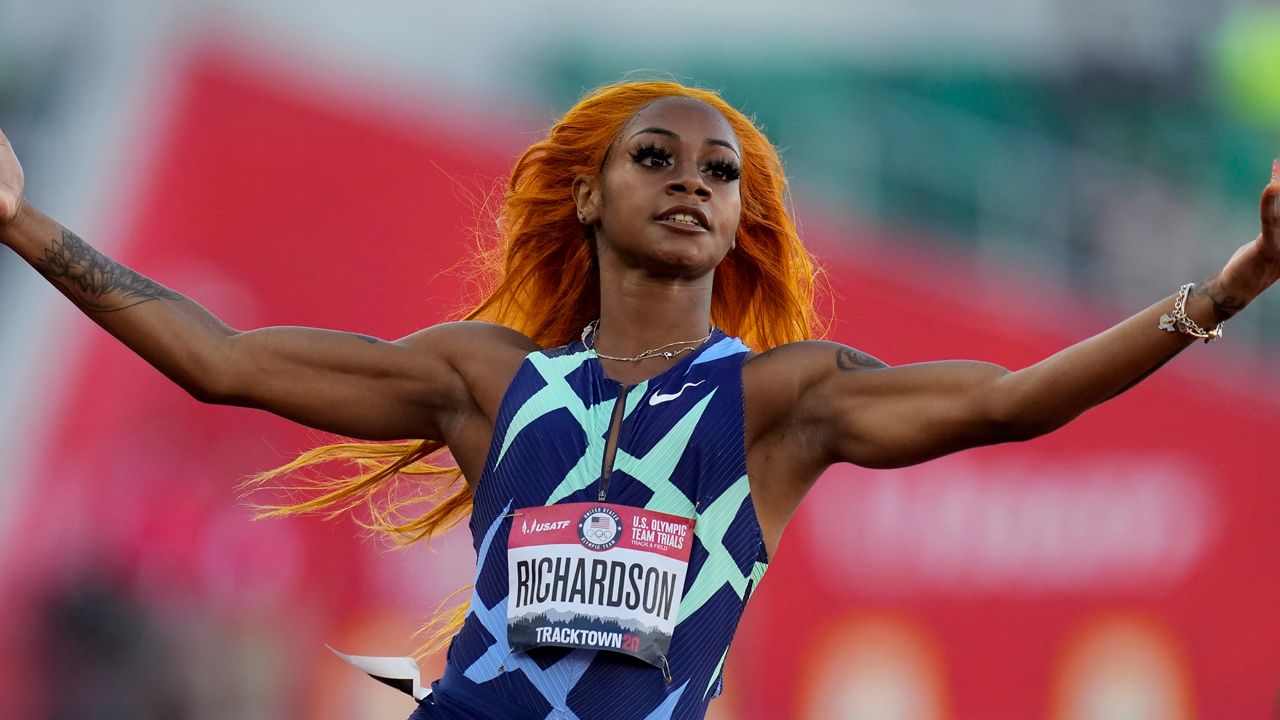After news of American sprinter Sha’Carri Richardson’s suspension from the Tokyo Olympics’ 100-meter race after testing positive for cannabis rocked the sports world, two prominent U.S. lawmakers sent a letter to U.S. Anti-Doping Agency asking them to reconsider her suspension and the policies that led to it.
“We urge you to reconsider the policies that led to this and other suspensions for recreational marijuana use, and to reconsider Ms. Richardson’s suspension,” New York Rep. Alexandria Ocasio-Cortez and Maryland Rep. Jamie Raskin, both Democrats, wrote. “Please strike a blow for civil liberties and civil rights by reversing this course you are on.”
Richardson tested positive for THC, a chemical found in cannabis, in a sample collected in competition at the U.S. Olympic team trials in Eugene, Oregon, last month. Richardson ran the 100-meter in 10.86 seconds, though her results were invalidated following the positive test. The 21-year-old Louisiana State University track phenom accepted a 30-day suspension.
"Richardson’s competitive results obtained on June 19, 2021, including her Olympic qualifying results at the Team Trials, have been disqualified, and she forfeits any medals, points, and prizes," the United States Anti-Doping Agency said in a statement earlier this month.
"The rules are clear, but this is heartbreaking on many levels; hopefully, her acceptance of responsibility and apology will be an important example to us all that we can successfully overcome our regrettable decisions, despite the costly consequences of this one to her," USADA CEO Travis T. Tygart said.
In a Twitter post, Ocasio-Cortez said the decision “lacks any scientific basis” and is “rooted solely in the systemic racism that's long driven anti-marijuana laws.”
"The ban on marijuana is a significant and unnecessary burden on athletes’ civil liberties,” the House lawmakers wrote in the letter. “WADA categorizes tetrahydrocannabinol (THC), the main active chemical in marijuana, as a prohibited competition substance. However, according to WADA’s own medical director, Alan Vernec, '[t]here is no evidence for cannabis use as a performance-enhancing drug.’"
“States across the country and governments around the world are increasingly legalizing marijuana,” they wrote in the letter, noting that it’s legal in 19 states, Washington, D.C., and Guam, including in Oregon, “where Ms. Richardson was when she used it to help her relax and cope with the death of her mother,” as well as where the Olympic Trials took place.
In an interview with NBC’s “Today” earlier this month, Richardson said that she used marijuana as a way of coping with her mother's recent death.
“I was definitely triggered and blinded by emotions, blinded by badness, and hurting, and hiding hurt,” she said in the interview. “I know I can't hide myself, so in some type of way, I was trying to hide my pain.”
“The increasingly widespread availability and permissibility of cannabis products makes it unsustainable for WADA and USADA to continue your policy of punishing athletes such as Ms. Richardson for the use of a substance that does not enhance their performance,” the letter continues, claiming that by the organization’s logic, alcohol and cigarettes should also be prohibited substances.
“Sports leagues have also evolved in their regulation of marijuana use by athletes,” the lawmakers added. “In recent years, Major League Baseball, the National Hockey League, and the National Football League have all removed penalties for marijuana use.”
“We are also concerned that the continued prohibition of marijuana while your organizations allow recreational use of alcohol and other drugs reflects anti-drug laws and policies that have historically targeted Black and Brown communities while largely condoning drug use in white communities,” they wrote. “Anti-marijuana laws have a particularly ugly history of systemic racism.”
WADA says that marijuana is a performance enhancing substance because it “reduces anxiety, allowing athletes to better perform under pressure and to alleviate stress experienced before and during competition,” according to a 2011 paper the organization published in “Sports Medicine.”
“Athletes who smoke cannabis … in-competition potentially endanger themselves and others because of increased risk taking, slower reaction times and poor executive function or decision making,” the paper also reads.
The letter comes just days after President Joe Biden said that he is “proud” of the way Richardson handled her drug test and the subsequent fallout, but noted that “the rules are the rules.”
"And everyone knows what the rules were going in,” Biden said Saturday, according to the White House pool report. "Whether they should remain that way is a different issue. But the rules are rules, and I was really proud of the way she responded," he added.
Richardson’s suspension has sparked a renewed debate on whether or not cannabis should be a prohibited substance in sport. Advocates say that rules which govern cannabis consumption can be arbitrary.
“There exists no scientific consensus that the acute effects of marijuana enhance athletic performance,” Paul Armentano, deputy director of advocacy group the National Organization for the Reform of Marijuana Laws, recently told Reuters.
"She was suspended because of arbitrary rules," Columbia University psychology professor Carl Hart told Reuters. “These liberalizing laws are highlighting the arbitrariness of our cannabis laws and the stupidity of them. This [ban] further shows the hypocrisy."








